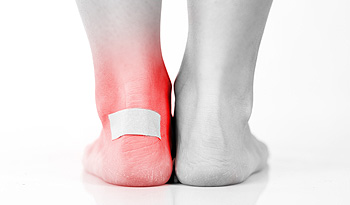While most people are somewhat familiar with blisters due to having at least one in their lifetime, here are some things you may not know about these “irritating” fluid-filled bubbles. Blisters fall into one of three categories typically: clear, blood, or infected. Clear blisters are one of the most common types of blisters, and are filled with a clear serum that protects the underlying skin from further damage. When blood vessels are damaged along with skin, the blister that forms may have blood mixed in with the serum. If a blister becomes infected, it can fill with white or yellow pus. Sudden, highly concentrated friction from ill-fitting shoes rubbing against skin on the foot will typically cause a blister, while repetitive, less intense friction will typically cause corns or calluses. Intense temperatures can also cause blisters to form, as in the case of second-degree frostbite or a bad sunburn. Chicken pox, shingles, eczema and other medical conditions may cause blisters as well as exposure to certain chemicals that create an allergic reaction in the skin. If you have developed a blister, do not pop it. If it does not improve, gets worse, or looks like it might be infected, seek the care of a podiatrist.
Blisters may appear as a single bubble or in a cluster. They can cause a lot of pain and may be filled with pus, blood, or watery serum. If your feet are hurting, contact one of our podiatrists of Active Foot and Ankle Care, LLC. Our doctors can provide the care you need to keep you pain-free and on your feet.
Foot Blisters
Foot blisters are often the result of friction. This happens due to the constant rubbing from shoes, which can lead to pain.
What Are Foot Blisters?
A foot blister is a small fluid-filled pocket that forms on the upper-most layer of the skin. Blisters are filled with clear fluid and can lead to blood drainage or pus if the area becomes infected.
Symptoms
(Blister symptoms may vary depending on what is causing them)
- Bubble of skin filled with fluid
- Redness
- Moderate to severe pain
- Itching
Prevention & Treatment
In order to prevent blisters, you should be sure to wear comfortable shoes with socks that cushion your feet and absorb sweat. Breaking a blister open may increase your chances of developing an infection. However, if your blister breaks, you should wash the area with soap and water immediately and then apply a bandage to the affected area. If your blisters cause severe pain it is important that you call your podiatrist right away.
If you have any questions, please feel free to contact our offices located in Fair Lawn, Riverdale, and Englewood, NJ . We offer the newest diagnostic and treatment technologies for all your foot care needs.







